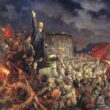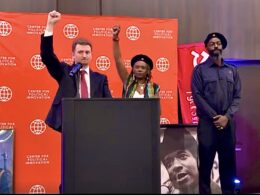If you want the Palestinian resistance to succeed, or the Houthi rebels to succeed, or the movement for liberation in the imperial center to succeed, then one of your big priorities needs to be working to unify Russia with the globe’s other anti-imperialist forces. Amid the rise of the multipolar world, and the growing strength of armed anti-imperialist groups, international monopoly capital’s best way to hold back progress is by creating divisions among those opposed to it.
This is the purpose behind the efforts from much of the “left” to separate Russia from other anti-imperialist countries. At the moment, the imperialism-compatible “socialist” formations are mainly trying to do this with China, Cuba, Africa, and Palestine. They’ll inevitably expand the project to more places, including the United States itself. They’re already doing this in the U.S. to an extent, simply by trying to discourage socialists in the empire’s core from taking a pro-Russia stance.
These agents of imperialist sabotage have made Russia into the big pressure point for sowing division because of the unique, and highly complex, set of circumstances which surround the country as it exists today. No other country has undergone such a wild series of shifts in its global role, and in such short a time, as Russia has. In the last thirty-five years, it’s gone from a member of a larger socialist formation, to a U.S. client state, to an increasingly independent global player, to what it is now: a crucial contributor to the transition away from U.S. dominance, with an economy that’s come to resemble its old socialist model the more that international tensions have prompted it to embrace illiberalism. There’s even a debate among Marxists over whether today’s Russia can now be considered socialist, as its prime industries have become nationalized (though we shouldn’t ignore that the country’s state and government continue to have a bourgeois class character).
The strategy of the actors within the opportunistic parts of the global socialist movement is to exploit the contradictions within modern Russia, using them to portray Russia as an inherent threat towards other sources of anti-imperialism. We’ve seen this with the suspicious rhetoric that these actors have directed towards Russia, wherein they’ve tried to make Russia’s role within the rise of multipolarity look like an overall negative thing. We’ve seen this with their efforts to separate Africa from Russia, where they’ve avoided trying to defend Russia by changing the subject to Africa. We’re going to increasingly see such narrative manipulations in relation to Palestine. And these actors have in effect already been using Palestine for that purpose, simply by advancing a type of rhetoric on Gaza that’s designed to exclusively appeal to anti-Russian liberals.
The tactic they use is to lie by omission. They leave out the context which shows how connected the different parts of the struggle against international monopoly capital are. The truth is that they’re the same struggle, which is quite an uplifting reality. That’s why from Korea to Palestine to the Sehal, fighters against the hegemon have been showing their support for Russia’s operation against the fascist U.S. puppet regime in Ukraine. The actors with an investment in keeping the struggle divided don’t want to understand this reality, though, so they’re telling a different story. A story where Russia represents a liability to the cause, and where those who support Russia therefore should be seen as suspect too.
The ideological justifications for holding this view aren’t necessarily based in theory. More often, they’re based in a shallow wokeism. Within the standard view of Russia that today’s liberals hold, the country is nothing more than a threat towards worldwide social progress. They crudely label it as “fascist,” and portray it as the prime factor to blame for the rise of far-right politics throughout the imperialist countries. Thereby, the types of leftists whose ideological framework comes from liberalism have adopted the same basic view of Russia. They don’t try to claim Russiagate is real, as that’s been discredited too well, so instead they reaffirm the perception about Russia being a cultural danger towards enlightened (or supposedly enlightened) society. Which is all the narrative managers need to do to sway the left towards being anti-Russian.
This narrative depends on the idea that social issues—specifically social issues as interpreted through the lens of the USA’s culture war—are inherently more important than the globe’s primary contradiction, that being the rule by monopolies. The attempts to argue that Russia is fascist on the basis of its LGBT policies don’t just rely upon a definition of “fascism” that’s detached from fascism’s necessarily economic nature. They rely on a view of the country that ignores the cultural context of its society, as compared to that of the western countries.
Where unjust policies towards sexual minorities exist in Russia, that’s for the country’s own people to rectify. Using these contradictions to reinforce liberal pro-imperialist notions about Russia’s economic and foreign policy role does nothing besides help the monopolists, who’ve developed an entire foreign interference strategy that’s centered around LGBT issues. What the U.S. empire has done is use the idea of “promoting LGBT rights” as a cover for destabilizing countries that defy the international financial system, sending NGOs to work as colonial missionary groups under the guise of advancing social progress.
This strategy is even more transparent when it’s applied to a country like China, where the government doesn’t have any religiously influenced social policies like Russia does. In China, sexuality and gender identity aren’t seen as highly important things, like they are in many countries where Christianity has defined the development of the national culture. So for the leftists who are pro-China and anti-Russia, it’s easier to identify the narrative manipulations around LGBT issues when it comes to the PRC.
The role of the Russian Orthodox Church, and the ways the Church has been clashing with the LGBT movement, represent more layers in Russia’s contradictions. Which makes it another way for the narrative managers to create divisions between anti-imperialists in the empire’s core, and the Russian anti-imperialists who pressured their government into the Ukraine operation. Within the narrative they’ve constructed, China is positioned as an embodiment of American wokeism, even though this is laughably far from the truth. And Russia is positioned as the villain in this story, as the “fascist” menace that will inevitably betray the PRC.
However much these things have led me to become alienated from the American left, I continue to be on the “left” in terms of the ideological spectrum. I oppose the growing efforts by reactionaries in my country to force trans and gay people back into hiding. Therefore, I don’t oppose the left’s social values. I only oppose the efforts by imperialism-compatible actors to use injustice for emotional manipulation, turning it into a rationale for sabotaging the struggle against empire.
Our ruling institutions want “communism” to be nothing more than a version of woke imperialism that claims to uphold Marx and Lenin. They’ve cultivated social media spaces that guide people with revolutionary potential towards making communism into just another niche subculture, one that in this form is not capable of winning the class conflict. This is how we get China supporters, or even DPRK supporters, who are at the same time anti-Russian. Our ruling elites want us to believe that to be a good communist, you have to adopt the same hostile stance towards Russia that the Democrats do. This is a cover for manufacturing splits between forces that are actually allies, and prolonging the global dictatorship of multinational banks and corporations.
————————————————————————
If you appreciate my work, I hope you become a one-time or regular donor to my Patreon account. Like most of us, I’m feeling the economic pressures amid late-stage capitalism, and I need money to keep fighting for a new system that works for all of us. Go to my Patreon here.
To keep this platform effective amid the censorship against dissenting voices, join my Telegram channel.








